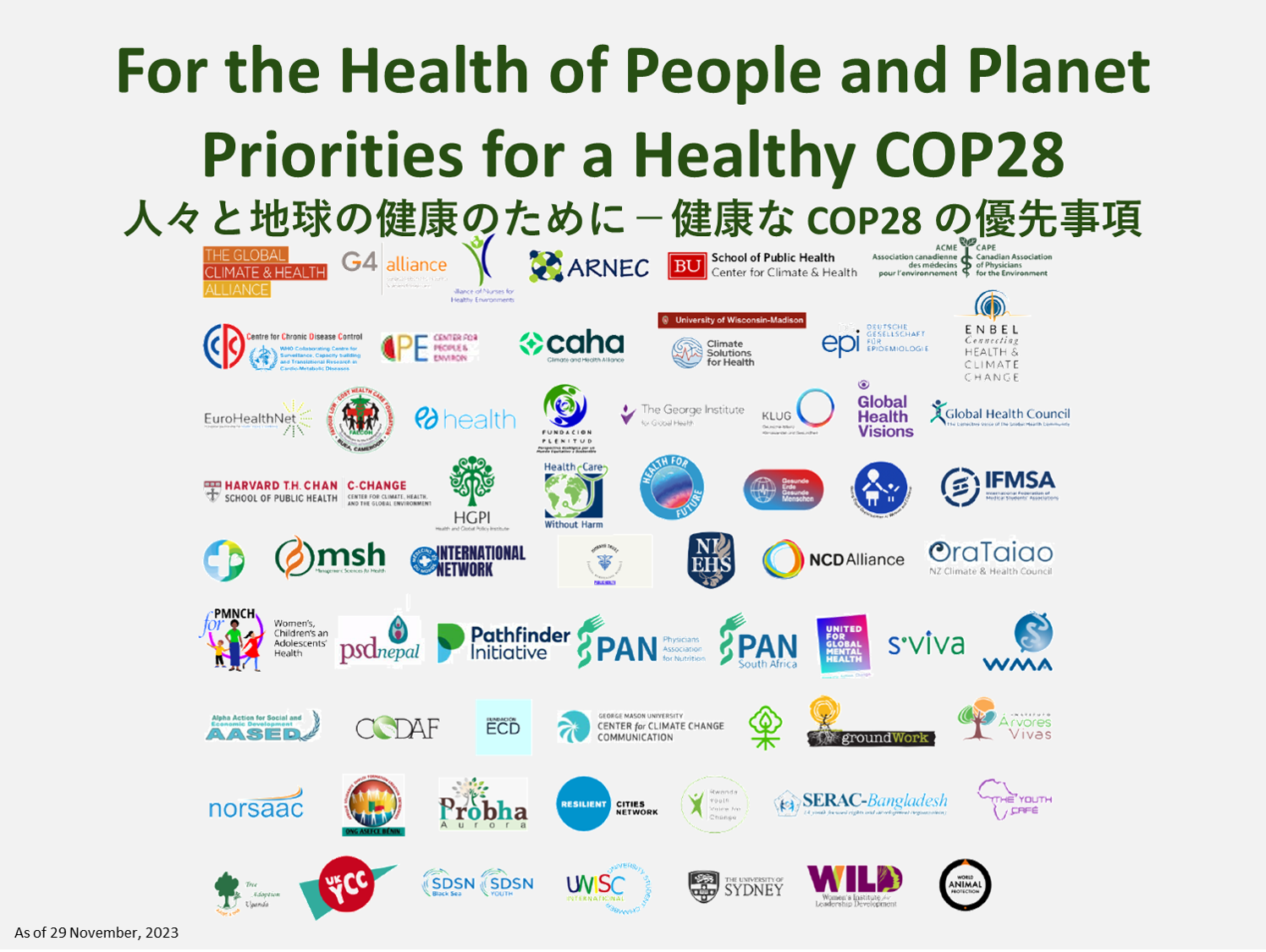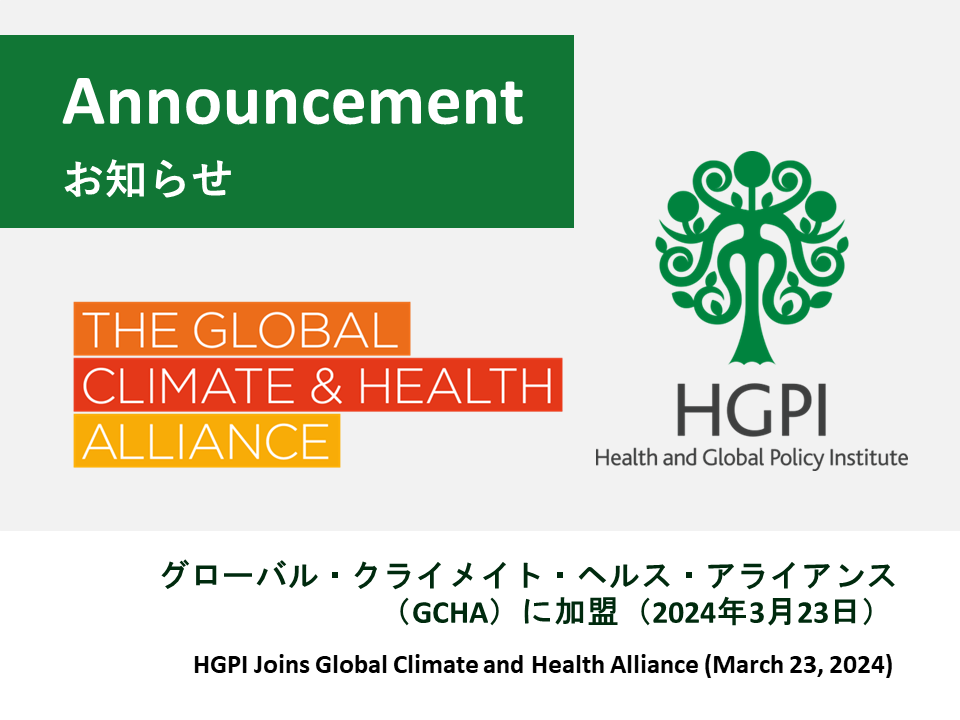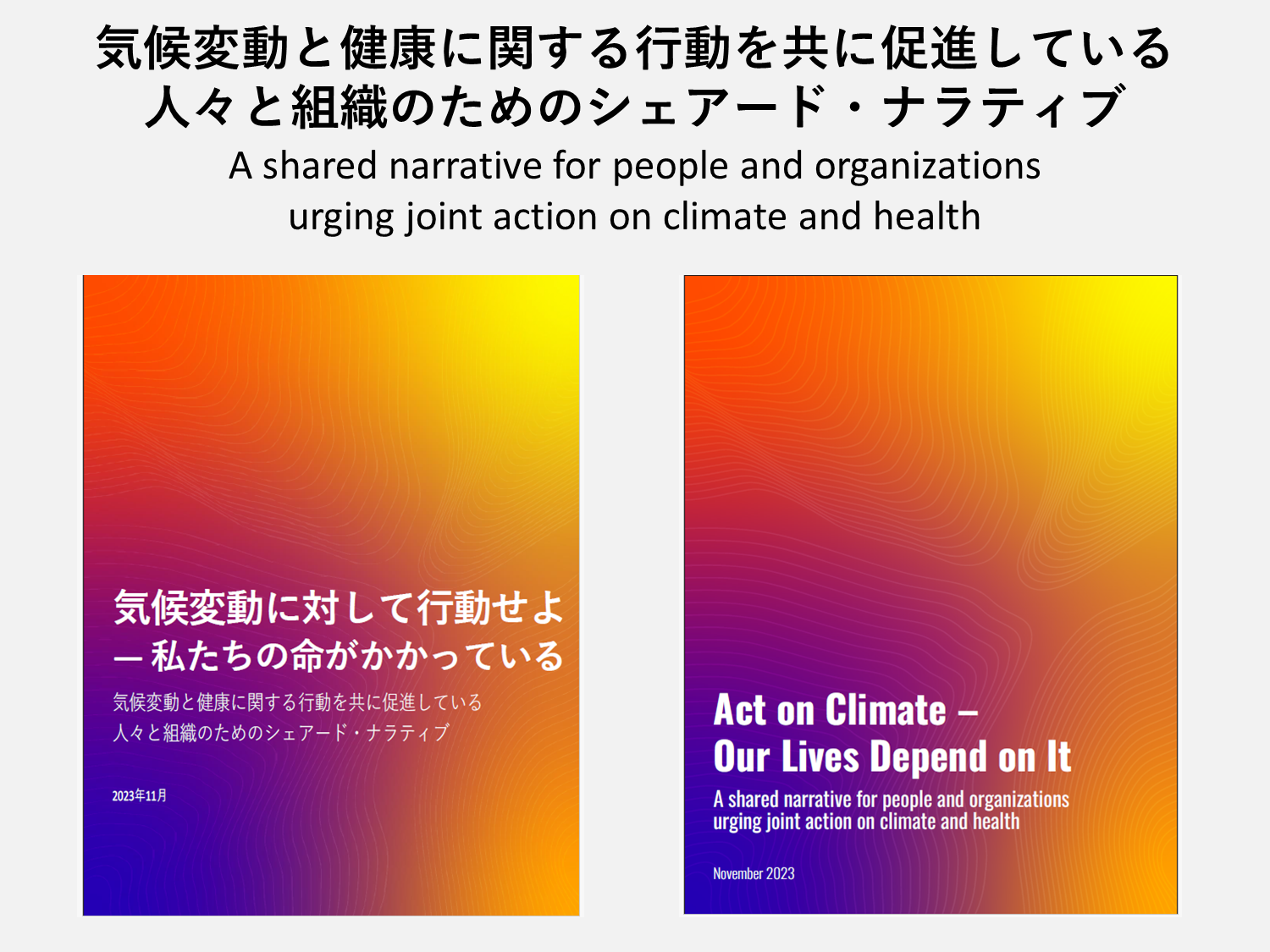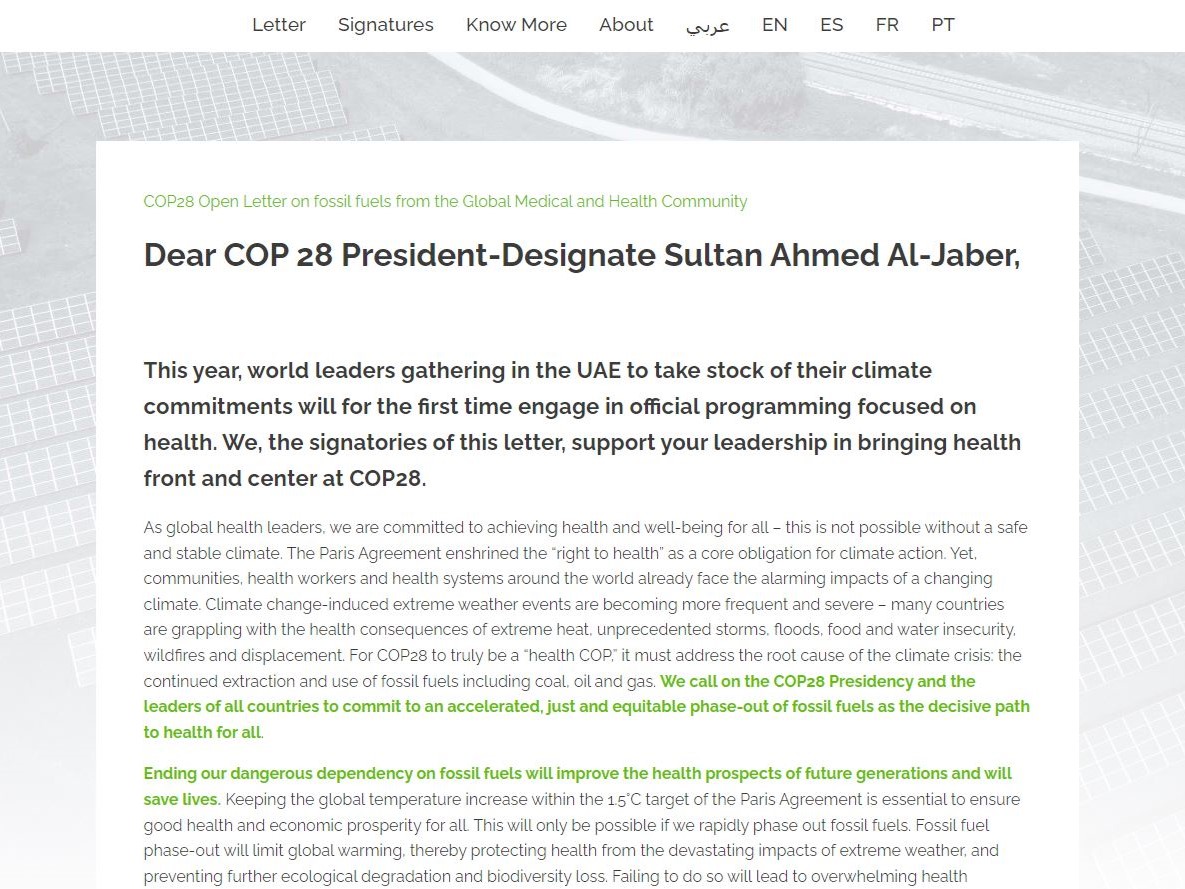[Announcement] Signs “A COP29 for People and Planet: Recommendations from the international health and climate community” (November 11, 2024)
date : 11/11/2024
Tags: Planetary Health
![[Announcement] Signs “A COP29 for People and Planet: Recommendations from the international health and climate community” (November 11, 2024)](https://hgpi.org/en/wp-content/uploads/sites/2/HGPI_20241111_COP29-GCHA-Recommendations-1.jpg)
On November 7, 2024, Health and Global Policy Institute’s (HGPI) Planetary Health Project signed “A COP29 for People and Planet: Recommendations from the international health and climate community”.
At the 28th Conference of the Parties (COP28) to the United Nations Framework Convention on Climate Change (UNFCCC) in 2023, the World Health Organization (WHO) and its COP28 Presidency, the United Arab Emirates (UAE), led the adoption of the COP28 UAE Declaration on Climate and Health, which was signed by 143 countries including Japan. In order for the Declaration to be shifted into action, financing the response to the climate crisis will be a key focus at COP29 to be held in Baku, Azerbaijan.
Actions and investments to accelerate adaptation and address loss and damage are already essential in many communities; and without ambitious mitigation, the limits of adaptation will rapidly be exceeded, with catastrophic losses and damages, including physical and mental health impacts. Finance is a prerequisite for climate action sufficient to protect human health.
The Global Climate and Health Alliance (GCHA) has coordinated the development of the recommendation, and HGPI provided suggestions in light of the situation surrounding health in Japan. ‘COP29 for People and Planet’ outlines recommendations from the international health and climate community and calls on Parties at COP29 to commit to and deliver ambitious climate action sufficient to protect and promote the health of people and the planet.
The nine headline recommendations are:
- IMPLEMENTATION REPORTING: Define mechanisms to allow follow up and reporting on agreed priorities for action on climate change and health set out in the UAE COP28 Declaration on Climate and Health.
- POLICY COHERENCE: Embed health and climate actions, targets, and associated economic considerations, in NDCs and other national policies, supported by strengthened intersectoral coordination.
- ENABLING FINANCE: Adopt a New Collective Quantified Goal (NCQG) on climate finance of necessary quantity and quality, without which health-promoting climate action will be infeasible.
- JUST ENERGY TRANSITIONS: Commit to the fast, fair, full and funded phase-out of fossil fuels including an immediate end to all expansion of fossil fuel production and infrastructure and a rapid and just transition to renewable energy as a public health imperative.
- HOLISTIC ADAPTATION: Lay foundations for adaptation planning and monitoring that reflects physical and mental health and wellbeing outcomes.
- LOSS AND DAMAGE RESPONSE: Capitalise the Fund for Responding to Loss and Damage to address the health and wider needs of impacted communities, while positioning the Santiago Network on Loss and Damage to support quantification of health losses and damages.
- RESILIENT AND SUSTAINABLE AGRICULTURE AND ECOSYSTEMS: Prioritise food and agricultural systems and land use that protect biodiversity and promote nutrition security, including sustainable healthy diets that are affordable and accessible.
- ENHANCED INTEGRITY: Manage conflicts of interest by strengthening policies to reduce undue influence of health- and climate-harming polluters in UNFCCC policymaking.
- COLLABORATION WITH MOST IMPACTED COMMUNITIES: Create environments which enable guidance for healthy climate action to be provided by most affected communities through their safe and meaningful engagement and participation.
Information and the report related to the recommendations can be found here (GCHA website).
Top Research & Recommendations Posts
- [Policy Recommendations] The Path to a Sustainable Healthcare System: Three Key Objectives for Public Deliberation (January 22, 2026)
- [Research Report] Perceptions, Knowledge, Actions and Perspectives of Healthcare Organizations in Japan in Relation to Climate Change and Health: A Cross-Sectional Study (November 13, 2025)
- [Research Report] The 2025 Public Opinion Survey on Healthcare in Japan (March 17, 2025)
- [Policy Recommendations] Reshaping Japan’s Immunization Policy for Life Course Coverage and Vaccine Equity: Challenges and Prospects for an Era of Prevention and Health Promotion (April 25, 2025)
- [Research Report] The 2023 Public Opinion Survey on Satisfaction in Healthcare in Japan and Healthcare Applications of Generative AI (January 11, 2024)
- [Research Report] AMR Policy Update #4: Cancer Care and AMR (Part 1)
- [Policy Recommendations] Developing a National Health and Climate Strategy for Japan (June 26, 2024)
- [Public Comment Submission] “Assessment Report on Climate Change Impacts in Japan (Draft Overview)” (December 24, 2025)
- [Research Report] The Public Opinion Survey on Child-Rearing in Modern Japan (Final Report) (March 4, 2022)
- [Research Report] Survey of Japanese Physicians Regarding Climate Change and Health (December 3, 2023)
Featured Posts
-
2026-01-09
[Registration Open] (Hybrid Format) Dementia Project FY2025 Initiative Concluding Symposium “The Future of Dementia Policy Surrounding Families and Others Who Care for People with Dementia” (March 9, 2026)
![[Registration Open] (Hybrid Format) Dementia Project FY2025 Initiative Concluding Symposium “The Future of Dementia Policy Surrounding Families and Others Who Care for People with Dementia” (March 9, 2026)](https://hgpi.org/en/wp-content/uploads/sites/2/dementia-20260309-top.png)
-
2026-02-05
[Registration Open] (Webinar) The 141st HGPI Seminar “Current Status and Future Prospects of Korea’s Obesity Policy: Voices of People with Lived Experience in Policy Promotion” (March 3, 2026)
![[Registration Open] (Webinar) The 141st HGPI Seminar “Current Status and Future Prospects of Korea’s Obesity Policy: Voices of People with Lived Experience in Policy Promotion” (March 3, 2026)](https://hgpi.org/en/wp-content/uploads/sites/2/hs141-top-1.png)








